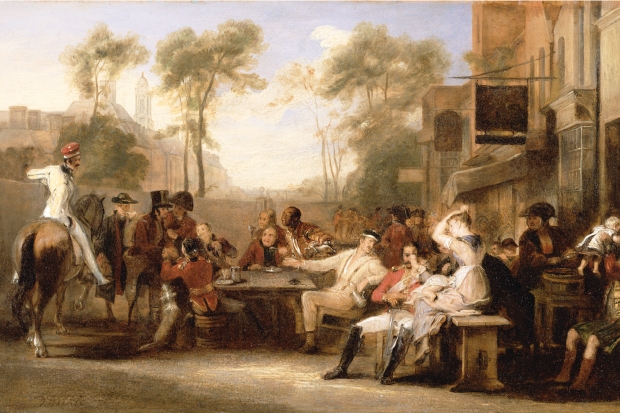Of all the big battalions of books marking the bicentenary of the battle of Waterloo that have come my way, this has to be the best. David Crane has used the bloody campaign as a telescope, bringing into sharp focus not just the carnage along the Brussels road, but the state of Britain itself: a country on the cusp of vast, irreversible change.
He achieves this within the compass of a single summer’s day — Sunday, 18 June 1815 — devoting a chapter to each hour and cutting cinematically between the three armies slaughtering each other in Belgium and the citizens at home. Some anxiously await news of triumph or disaster; others are utterly oblivious of what the cannonade rolling across the Channel, clearly heard by Kentish churchgoers, portends.
The result is a rich feast of a book: dramatic, poignant, funny, gruesome and tragic by turns. Crane selects a small cast to people his narrative, and involves us in their destinies without ever losing sight of the bigger picture. He persuasively argues that Waterloo was not only the bloodiest European struggle of the 19th century; it was also the watershed event which killed the old country — rural, hierarchical, devout, reactionary and inward-looking — and ushered in a new nation — urban, industrial, sceptical, expansionist and
forward-looking.
The characters whose stories he tells range from Wellington himself to Eliza Fenning, a kitchen maid awaiting execution in the fetid hellhole of London’s Newgate prison for the crime — which she may or may not have committed — of attempting to poison her employers with a dish of dumplings laced with arsenic.
The Iron Duke emerges with flecks of rust on his otherwise stainless-steel reputation. He doubted the quality of the motley bag of a multinational army he commanded, and nervously awaited the arrival of the Prussians to make his victory sure. Unwilling to share the credit with the indomitable Marshal Blucher, he lived off the reflected glory of his single encounter with Napoleon — much the greater soldier — for the rest of his long life, while privately acknowledging — ‘It was a damn near run thing’ — how close he had come to defeat.
Eliza Fenning was adopted as a cause célèbre by the small band of radical journalists and liberal lawyers who are the true heroes of Crane’s narrative. Sentenced to hang on flimsy evidence by ‘Black Jack Silvester’, a hidebound Tory hanging judge, and clad all in virginal white, Eliza swung from Newgate’s gallows together with a murderer named Oldfield, who chivalrously shielded her from the contamination of hanging alongside another man called Abrahams, sentenced to die for sodomy.
These savage sentences are a reminder of how callously cruel the age of Waterloo was. There were more than 200 capital crimes on the statute book in the England of 1815, and on the day that Eliza died another woman stepped ashore in Botany Bay — transported to Australia for stealing a few shreds of muslin cloth. Life was cheap, too, for the ruling caste. Amidst the bell-ringing and rejoicing as news of the famous victory spread, there was much hand-wringing and tears aplenty for the gallant young titled blades whose heads or limbs had been lopped off by a passing cannon ball or the sweep of a French cuirassier’s sabre.
Among the most affecting of Crane’s vignettes is his description of the long-drawn-out death of Sir William De Lancey, Wellington’s chief of staff, bowled off his horse by a cannon ball which struck his back, separating his ribs and spine. Summoned to Waterloo from his honeymoon in Brussels, he had enjoyed a week of bliss with his bride Magdalena before she came to nurse him through his final week’s agony in a hovel amid the sights and sounds of the battle’s aftermath.
News of the victory officially arrived in London with Wellington’s dispatch, brought hot-foot from the battlefield by a Major Percy with a couple of Bonaparte’s captured Imperial Eagle standards sticking out of his cab windows. (Unofficially, the first tidings probably arrived on a fast yacht chartered by the banker Nathan Rothschild, so that he could make another sort of killing off the back of the battle on the stock exchange.) After tracking down the prime minister, Lord Liverpool, at dinner, Percy was instantly promoted to Lieutenant Colonel by a delighted Prince Regent, before being allowed home to change the uniform he had worn for a week. As Percy undid his blood-stiffened sash, bits of a fellow officer’s brains, lodged in the garment, fell to the floor.
Not everyone rejoiced in the victory. Bonaparte had his British fans too, such as the scandalous poet Lord Byron and the angry hack William Hazlitt, who preferred the Corsican adventurer to a restoration of the reactionary Bourbons. As 1815 opened Britain’s century as the world’s
global superpower, it is such contrarian malcontents, swimming against the blood-dimmed tide, who most attract David Crane’s admiration.






Comments